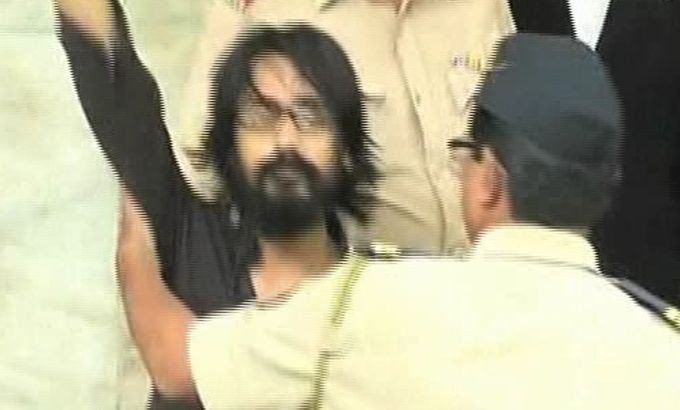Jailed Indian cartoonist wants charges lifted
Activist says Aseem Trivedi has declined to be released until the sedition charges against him are withdrawn.

A court in Mumbai has granted bail to an Indian cartoonist whose arrest on sedition charges over his work attacking the government has caused outrage, according to media reports.
The Press Trust of India reported on Tuesday that Aseem Trivedi, a freelance cartoonist and anti-corruption campaigner, had been granted bail by the Bombay High Court, while NDTV television said he would be released with a personal bond of 5,000 rupees ($90).
However, Trivedi has declined to be released until the charges are withdrawn, the Times of India newspaper reported quoting Mayank Gandhi, an activist for the India Against Corruption campaign.
Trivedi’s lawyer, who was unavailable to confirm the reports, told AFP news agency earlier on Tuesday that his client would not apply for bail and wanted the charges against him thrown out.
Trivedi was arrested in Mumbai under laws governing sedition, information technology and protecting India’s national flag and constitution after a private complaint from a young lawyer based in the city.
A court in Mumbai ordered on Monday that Trivedi be held in custody until September 24.
Bail refused
Trivedi refused bail at the court hearing, saying he would remain in jail until the sedition charges against him were lifted.
The court then extended his stay in police custody from one week to two.
“I am proud of what I have done. If telling the truth makes me a traitor, then I am one,” Trivedi said as dozens of police escorted him out of the court.
His arrest has sparked a mounting domestic and international backlash against the government, accused by critics of using colonial era laws to crush dissent.
“Politicians must learn to be tolerant. This is not a dictatorship,” Markandey Katju, a former supreme court justice who now heads the Press Council of India, told CNN-IBN television.
Media rights group Reporters Without Borders called for the immediate and unconditional release of Trivedi.
Students, opposition politicians and free speech advocates protested that Trivedi’s arrest – on the very serious charge of sedition no less – showed politicians’ increasing sensitivity to criticism.
Anti-corruption campaign
Taken aback by the vehement protests, RR Patel, home minister of Maharashtra state, said the government would review Trivedi’s case and the charge, which is punishable by up to life in prison.
Trivedi, a freelance cartoonist, was one of two winners of the 2012 Courage in Editorial Cartooning Award by the US-based Cartoonists Rights Network International.
His cartoons lampooning widespread corruption among Indian politicians were displayed at a Mumbai protest in December by the anti-corruption crusader Anna Hazare.
The Mumbai-based lawyer’s complaint to police cited one of those drawings that showed the four lions that form India’s national symbol replaced by four wolves and the national slogan “truth shall prevail” replaced by “corruption shall prevail”.
Ambika Soni, India’s information minister, stressed that the constitution guaranteed freedom of expression but “also lays downs that we as Indian citizens should respect all national symbols.
“Our government is not for censorship; it is for self-regulation at every step,” she said.
Troubling precedents
Trivedi’s arrest came five months after a university professor was arrested in West Bengal for forwarding an email cartoon that caricatured Mamata Banerjee, the state’s chief minister.
Last month, a farmer in West Bengal was arrested and branded a Maoist sympathiser after questioning Banerjee on her farm policy at a public meeting.
Both are out on bail and face lesser charges than sedition.
Earlier this year, senior education officials resigned amid a parliamentary uproar over a textbook that included a six-decade-old cartoon criticising delays in crafting the constitution.
Indian law defines sedition as an act that brings hatred or attempts to excite disaffection towards the government.
The law dates from India’s colonial era when British rulers used it against Indian freedom fighters,
including India’s independence leader Mohandas K Gandhi.